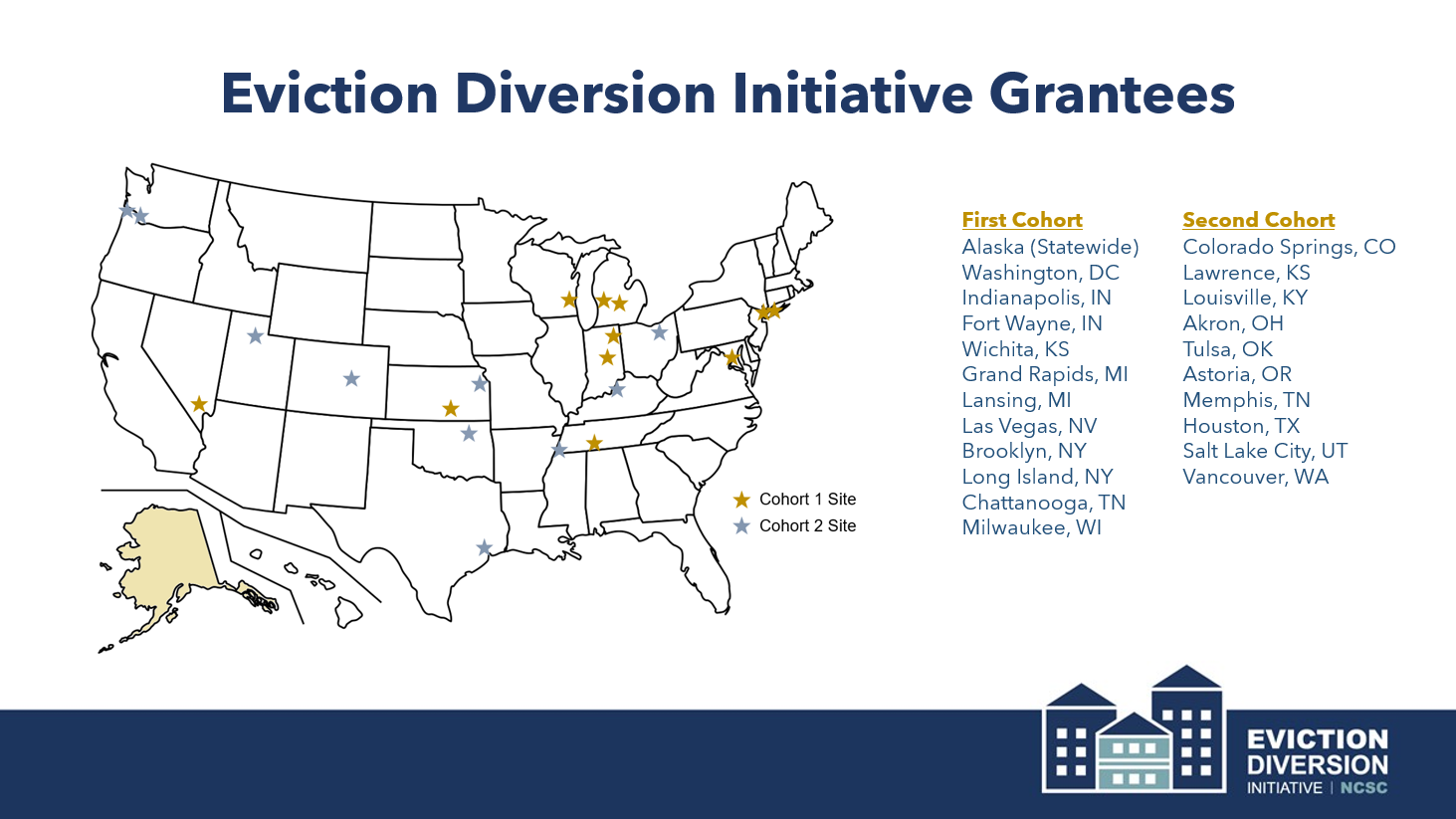Over 3.5 million eviction cases are filed each year in state courts. Each case has the potential not just to disrupt a family’s housing, but also the ability of family members to access and maintain employment, education, financial security, and health care with disproportionately destabilizing effects on communities of color. Housing providers also struggle with costly and time-consuming eviction proceedings that may threaten their ability to make mortgage payments and maintain their properties. The ripple effects of eviction reach far beyond the impacted parties and can also have a destabilizing effect on entire communities. While evictions do not begin in state and local courts, they are finalized there. Tenants often fail to appear in eviction court, and when they do appear, they rarely have the assistance of a lawyer or the information and resources to navigate the court process. During the Covid-19 pandemic, increased federal funding created new opportunities for courts to restructure their court processes with a greater emphasis on connections to rental assistance, mediation, and legal aid programs. These improvements have shown what kind of change is possible, but they have also made very clear the level of investment and innovation necessary to permanently change the eviction process to better serve litigants and communities.
NCSC’s Eviction Diversion Initiative (EDI) is a four-year, $11.5 million grant program that offers state and local courts an opportunity to learn from and improve upon pandemic-era best practices and to create permanent changes to their high-volume, high-impact eviction dockets. Participating jurisdictions receive funding to hire dedicated court staff and ongoing technical assistance to update their eviction court procedures to emphasize holistic, sustainable, and community-driven resolutions to housing problems. Each EDI court will implement a new eviction diversion program or enhance an existing one, with an emphasis on using the court process to connect litigants with the time, information, and resources necessary to resolve their housing disputes in a less harmful manner. By leveraging the existing services in their communities, participating courts can reduce the number of evictions and mitigate their harm.
The EDI Advisory Council selected 22 state and local courts to participate in the Eviction Diversion Initiative through a competitive application process. More information about the application process and eligibility criteria is available in the Request for Applications.

First Cohort (2022-2024 Grant Cycle)
- Alaska: Alaska Court System (Statewide)
- Indiana: Allen County Superior Court (Fort Wayne)
- Indiana: Lawrence Township Small Claims Court (Indianapolis)
- Kansas: 18th Judicial District Court (Wichita)
- Michigan: 54A District Court (Lansing)
- Michigan: 61st District Court (Grand Rapids)
- Nevada: Las Vegas Justice Court
- New York: Brooklyn Housing Court
- New York: Suffolk County District Court (Long Island)
- Tennessee: Hamilton County General Sessions Court (Chattanooga)
- Washington, DC: District of Columbia Courts
- Wisconsin: Milwaukee County Circuit Court
Second Cohort (2023-2025 Grant Cycle)
- Colorado: 4th Judicial District Court (Colorado Springs)
- Kansas: Douglas County Court (Lawrence)
- Kentucky: Jefferson County District Court (Louisville)
- Ohio: Akron Municipal Court
- Oklahoma: Tulsa County District Court
- Oregon: Clatsop County Circuit Court, Astoria
- Tennessee: Shelby County General Sessions Court (Memphis)
- Texas: Harris County Precinct 1 & 2 (Houston)
- Utah: Third District Court, Salt Lake City
- Washington: Clark County Superior Court (Vancouver)
Eviction diversion programs provide landlords and tenants with time, information, and resources to resolve their housing problems outside of the traditional litigation process. While each diversion program model is different, all of them create structured opportunities in the formal eviction process to connect landlords and tenants to a wide range of legal, financial, and social services that may be able to resolve the immediate legal issue and address the underlying factors that may have contributed to it.
Read Highlights from Year One of the Eviction Diversion Initiative.
Read case studies of different eviction diversion models: Alaska Court System | Las Vegas Justice Court | Lawrence Township Small Claims Court
EDI Advisory Council
- Chief Judge Anna Blackburne-Rigsby, Court of Appeals, Washington DC
- Chief Justice Nathan Hecht, Supreme Court of Texas
- Stephanie Hess, Administrative Director, Supreme Court of Ohio
- Rodney Maile, Administrative Director of the Courts, Hawaii State Judiciary
- Dawn Marie Rubio, State Court Administrator, Washington State Courts
- Chief Justice Loretta Rush, Supreme Court of Indiana
- Katherine Stocks, Director and State Court Administrator, Supreme Court of Nevada
- Connie Wright, Wells Fargo Foundation